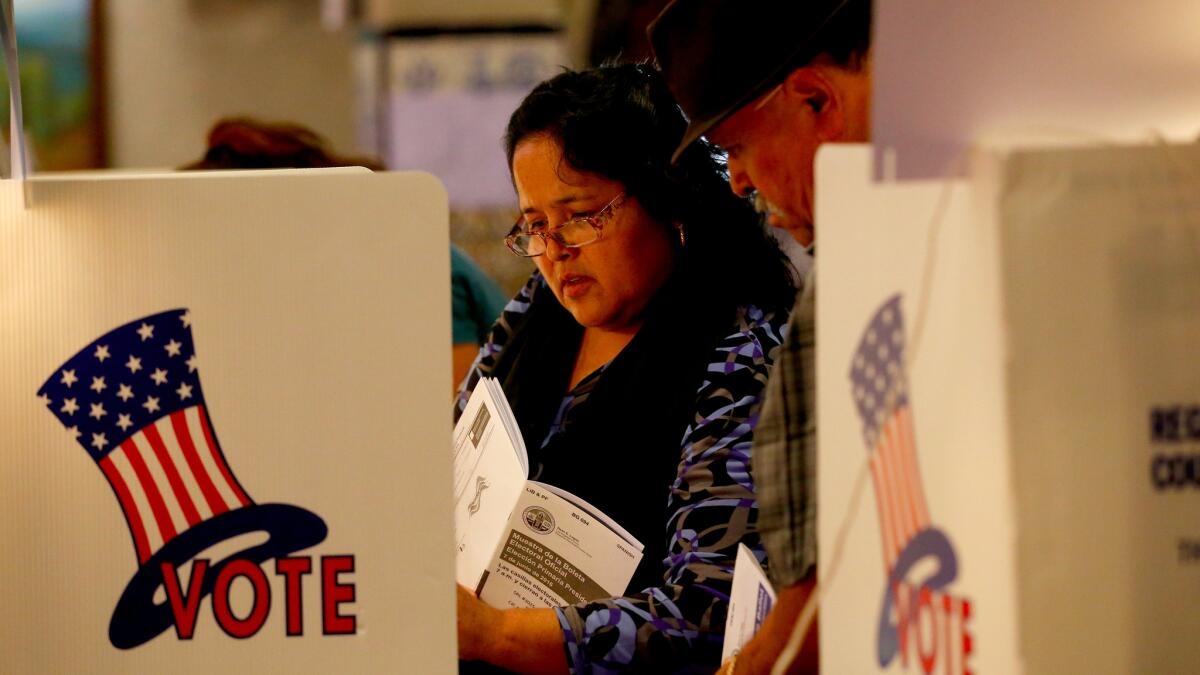California’s very long November ballot is now official — and it might get even longer

- Share via
Reporting From Sacramento — California elections officials announced Thursday that 17 measures have earned a spot on the Nov. 8 statewide ballot, a bumper crop of voter choices ranging from marijuana legalization to repeal of the death penalty and even new workplace rules for actors in adult movies.
It is the longest list of state propositions on a single ballot since March 2000, and could grow longer still as lawmakers consider placing three more measures on the ballot in August.
“Hardly anything on this ballot is boring,” said Thad Kousser, a political science professor at UC San Diego who studies the initiative process. “These are all hot-button issues, and ones that will generate big time advertising expenditures.”
Four of the propositions earned a spot on the fall ballot with only hours to spare on Thursday, including two tax proposals and a sweeping prison proposal championed by Gov. Jerry Brown.
Millions of Californians signed petitions to place the initiatives on the fall ballot, signatures collected on street corners and in shopping mall parking lots. Political consultants said this was one of the most challenging seasons for signature gathering in recent history, with some campaigns paying for-profit companies as much as $5 per voter signature.
Secretary of State Alex Padilla finalized the list on Thursday, as required by law 131 days before an election.
Get the latest news on what’s happening in California politics »
Six of the 17 propositions seek to amend the state constitution. They include Brown’s effort to revamp the rules on parole from state prison, and a requirement that neither house of the Legislature pass any bill that hasn’t been available for public review for at least three days.
Nine measures will ask voters to enact new state laws, with proposals on everything from new background checks for buying ammunition to a $9-billion bond for school construction and modernization projects. Voters will consider, too, the merits of an effort to impose a cap on prescription drug prices paid by state healthcare officials that will be fought with an expensive opposition campaign by the pharmaceutical industry.
The ballot also includes a referendum — voters will choose to accept or reject a law that bans single-use plastic bags statewide. That law was signed by Brown in 2014 and will take effect only if voters cast a “yes” vote on the referendum.
While some of the issues seem relatively simple on the surface, others will likely require voters to take a much deeper look.
“It’s not only a very long ballot, it’s also a very complex ballot,” said Beth Miller, a Republican political strategist.
Miller, whose firm is working against a November initiative to raise tobacco taxes by $2 a pack, said the challenge for all ballot measure campaigns this fall is finding a way to cut through the political noise generated by as much as $500 million in total spending on TV commercials, mailers and other advertising.
“It’s definitely going to be challenging for the campaigns to get voter attention,” she said.
Ballots loaded full of propositions were a staple of California elections as recently as the 1980s and 1990s, and were common, too, in the early years after the state’s initiative process was created in 1912.
This fall’s statewide ballot could have been even longer, were it not for a 2014 state law that allowed initiative proponents to negotiate with the Legislature even after submitting enough signatures to qualify a measure. Bolstered by a successful initiative campaign, backers of a $15-an-hour minimum wage forced the governor and lawmakers to take similar action in March.
John Matsusaka, president of the Initiative and Referendum Institute at USC, said the historical average is 17 propositions, the same as now slated for November.
“I think there’s pretty good evidence that voters make good decisions if they have the time,” he said.
Matsusaka’s research finds no significant evidence that voters facing a long ballot skip over some propositions — a common fear among campaign consultants — but rather that they simply seem to get angry at having to wade through a long list.
“The longer the ballot, every single proposition gets more ‘no’ votes,” he said. “And a tight race on a long ballot could fail.”
While Thursday marked the official deadline, the fall ballot could potentially get even longer by the end of August. Three additional proposals are making their way through the Legislature: Two bond measures for housing and parks projects, and one effort to reclassify some property crimes as felonies, which supporters say would fix a 2014 initiative passed by voters.
In a state Senate committee hearing on Wednesday to consider the proposed parks bond, lawmakers admitted that they worry about further expanding the panoply of propositions for the fall.
“I’m having a real tough time saying, how do you add one more?” asked state Sen. John Moorlach (R-Costa Mesa).
Follow @johnmyers on Twitter, sign up for our daily Essential Politics newsletter and listen to the weekly California Politics Podcast
ALSO:
The fall ballot in California could be a $500 million battle
Initiative to legalize marijuana qualifies for California’s November ballot
Updates on California politics
More to Read
Get the L.A. Times Politics newsletter
Deeply reported insights into legislation, politics and policy from Sacramento, Washington and beyond. In your inbox three times per week.
You may occasionally receive promotional content from the Los Angeles Times.











